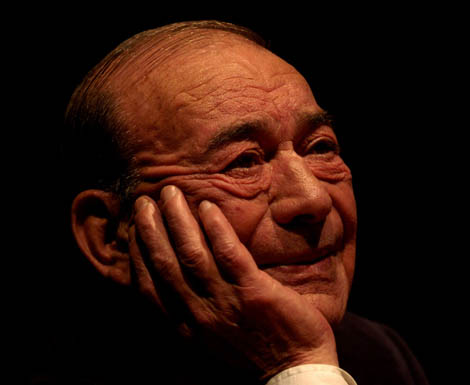 The showing of your latest movie Slow Motion and an evocative exhibition are the two initiatives that the Cineclube de Faro and the City Council of Faro organize, to honor Fernando Lopes, Portuguese filmmaker who died in May.
The showing of your latest movie Slow Motion and an evocative exhibition are the two initiatives that the Cineclube de Faro and the City Council of Faro organize, to honor Fernando Lopes, Portuguese filmmaker who died in May.
«Fernando Lopes (28.12.1935-02.05.2012) was a shrewd film, ethical requirement, great generosity and immense tenderness. A unique observer of the Portuguese identity, an accomplice of the best Portuguese literature and a master in the way he treated our people, Fernando Lopes leaves many nostalgia but, beyond them, a unique, timeless and necessary work», emphasize the two entities.
Thus, on July 16, the Cloisters of the Municipal Museum of Faro receive an Evocative Exhibition that will be inaugurated at 21:00 pm by Pedro Lopes, son of the director, who will also present, at 21:30 pm, his father's latest film, Slow Motion, which starts the Open Air Film Festival that runs until the 27th of July in that same location.
Who was Fernando Lopes?
Fernando Lopes spent his childhood in Ourém, under the care of an aunt, and came to Lisbon at the age of ten to meet his mother.
Shortly thereafter, he began working as a shipper, as he continued his studies, in Technical Education.
It stands out for the realization through the film club movement (he was a member of the Cineclub Image, animated by José Ernesto de Sousa). In 1957, he joined the technical staff of Rádio e Televisão de Portugal, then inaugurated.
In 1959 he became a scholarship holder of the National Film Fund, which took him to the London Film School, in England, obtaining a diploma in Film Directing.
In 1964, he helped to open, with «Belarmino», the Cinema Novo Português.
Fernando Lopes was also co-founder and director of RTP2 in the 1980s. He taught for several years in the Cinema Course at the Lisbon Theater and Cinema Superior School, having marked different generations of Portuguese filmmakers and cinema technicians.
From his vast and important work, in addition to Belarmino, documentary titles such as By God's will e We are all well here, literary adaptation works such as a bee in the rain (Carlos de Oliveira) The Delfim (José Cardoso Pires) or The Horizon Thread (Antonio Tabucchi) or original fiction like the smiles of fate or his film-will, shot in very difficult health conditions, Slow Motion.


















Comments